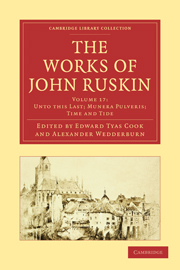Book contents
- Frontmatter
- Contents
- LIST OF ILLUSTRATIONS
- INTRODUCTION TO THIS VOLUME
- PART I “UNTO THIS LAST” (1860)
- BIBLIOGRAPHICAL NOTE
- CONTENTS
- PREFACE (1862)
- TEXT
- PART II “MUNERA PULVERIS” (1862, 1863)
- PART III “TIME AND TIDE, BY WEARE AND TYNE” (1867)
- APPENDIX: LETTERS AND PAPERS ON ECONOMIC SUBJECTS 1863–1873
- Plate section
TEXT
Published online by Cambridge University Press: 05 November 2011
- Frontmatter
- Contents
- LIST OF ILLUSTRATIONS
- INTRODUCTION TO THIS VOLUME
- PART I “UNTO THIS LAST” (1860)
- BIBLIOGRAPHICAL NOTE
- CONTENTS
- PREFACE (1862)
- TEXT
- PART II “MUNERA PULVERIS” (1862, 1863)
- PART III “TIME AND TIDE, BY WEARE AND TYNE” (1867)
- APPENDIX: LETTERS AND PAPERS ON ECONOMIC SUBJECTS 1863–1873
- Plate section
Summary
1. Among the delusions which at different periods have possessed themselves of the minds of large masses of the human race, perhaps the most curious—certainly the least creditable — is the modern soi-disant science of political economy, based on the idea that an advantageous code of social action may be determined irrespectively of the influence of social affection.
Of course, as in the instances of alchemy, astrology, witchcraft, and other such popular creeds, political economy has a plausible idea at the root of it. “The social affections,” says the economist, “are accidental and disturbing elements in human nature; but avarice and the desire of progress are constant elements. Let us eliminate the inconstants, and, considering the human being merely as a covetous machine, examine by what laws of labour, purchase, and sale, the greatest accumulative result in wealth is obtainable. Those laws once determined, it will be for each individual afterwards to introduce as much of the disturbing affectionate element as he chooses, and to determine for himself the result on the new conditions supposed.”
2. This would be a perfectly logical and successful method of analysis, if the accidentals afterwards to be introduced were of the same nature as the powers first examined. Supposing a body in motion to be influenced by constant and inconstant forces, it is usually the simplest way of examining its course to trace it first under the persistent conditions, and afterwards introduce the causes of variation.
- Type
- Chapter
- Information
- The Works of John Ruskin , pp. 25 - 114Publisher: Cambridge University PressPrint publication year: 2010First published in: 1905

